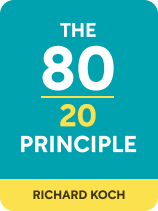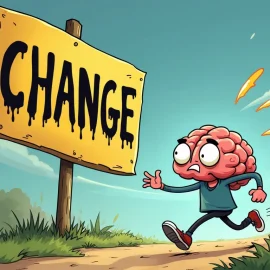

This article is an excerpt from the Shortform book guide to "The 80/20 Principle" by Richard Koch. Shortform has the world's best summaries and analyses of books you should be reading.
Like this article? Sign up for a free trial here .
What is the key to success? How do your ideas of what it takes to achieve success compromise your ability to do so?
Many people believe success is a matter of luck, talent, or intelligence. While these things matter, the key to success lies in your mindset. According to Richard Koch, the author of The 80/20 Principle, there are three core beliefs you must internalize to embark on the path of success: 1) major improvements are always possible, 2) it’s your duty to enjoy life, and 3) time is abundant.
Let’s examine the mindset shifts you must make to invite success into your life.
#1: Major Improvements Are Always Possible
What is the key to success? In his book The 80/20 Principle, Koch argues that the key to success lies in how we think about success and achievement. The first step to adopting the success mindset is to abandon the notion that we’ve already done all we possibly can to improve our lives, as this mindset will prevent us from realizing our potential.
Instead, we must internalize the belief that we can greatly improve the quality of our lives by applying the 80/20 Principle. The reality, Koch says, is that we can always make major improvements to increase our wealth, happiness, freedom, and knowledge—either by doing things differently or doing less. Once we embrace this insight, we can take action to expand the 20% of our lives that help us make those improvements.
#2: It’s Our Duty to Enjoy Life
Second, Koch says we need to stop feeling guilty for working less and doing things we enjoy. We must abandon the notion that seeking pleasure equates to selfishness, laziness, or apathy. This mindset leaves us unfulfilled, resentful, and tethered to tasks and people that undercut our joy.
(Shortform note: Research shows that our brains are hardwired to seek pleasure, so Koch’s advice to give up guilt around doing things we enjoy syncs up with our evolutionary design. Humans have an inherent drive to seek pleasure, which is what drove our ancestors to find food, shelter, and mating opportunities. So, enjoying ourselves is natural—and actually helps us stay healthy by reducing stress.)
Instead, we must embrace the belief that it’s our duty to seek pleasure and enjoy life. Why? According to Koch, we have a duty to achieve greatness, and we’re much more likely to achieve greatness when we enjoy pursuing it. However, Koch does not endorse a life of total relaxation and luxury. He says pleasure-seeking must go hand-in-hand with extreme ambition—“ambition” in the sense of wanting to contribute value and change things for the better.
Koch says we need to apply the 80/20 Principle to focus on the 20% of activities that bring us pleasure. Filling our lives with enjoyable activities will help us cultivate the mindset necessary to achieve greatness. We’ll be happier doing things we actually enjoy and thus become more productive, which will enable us to prosper.
(Shortform note: Research supports Koch’s assertion: A study on over one million people found that happier people earn more rewards, have better relationships with peers, and are more likely to become leaders. Furthermore, they tend to be healthier, more creative, and more motivated to succeed. These results held even after accounting for a range of variables, including status, gender, race, and education.)
#3: Time Is Abundant
Third, Koch says that we need to give up the belief that there is a shortage of time. When we regard time as a scarce resource, the only option we can see for doing more of what we love is to squeeze pleasurable activities into the gaps of our lives. We feel compelled to do more because we think that doing more with a seemingly small amount of time is the only way to experience more of what we want. We can’t see any way to eliminate anything without compromising our livelihoods.
Instead, Koch says we need to embrace a completely new view of time. In reality, he says, time is abundant, and this perspective will revolutionize our lives: According to the 80/20 Principle, we’re most productive during a mere 20% of the time we spend working. If we simply focus our time on the 20% of tasks that deliver the highest return, that leaves 80% of our time open, and we can choose whether to spend this time on pleasurable pursuits or more high-return, productive work. From this perspective, time isn’t scarce—80% is plenty of time for the activities, both professional and personal, that give life meaning.
| Does Working Less Really Lead to Success, and Is It Even Possible? Although Koch says that working less is key to multiplying our happiness and success—and that everyone can control how they allocate their time, to greater or lesser degrees—others challenge this assertion. Researchers point out that many people do not have as much control over their life circumstances as Koch seems to imply. For example, people in poverty often have such an intense focus on stretching their scarce resources that it absorbs all their mental capacity. Thus, they have negligible “cognitive bandwidth” to pursue job training, education, leisure, or other activities that could help alleviate their suffering and lead them out of poverty. Further, people who deal with stressors such as discrimination, limited access to health care, and exposure to crime are highly susceptible to physical and mental disorders that limit their opportunities. What about people at the opposite end of the earnings spectrum? Are they as free from hard work as Koch states? Many self-made millionaires say absolutely not. In fact, they attribute their success to working long, hard hours. For example, entrepreneur and Shark Tank star Daymond John says the secret to success comes down to one thing: work. He says that to succeed, people need to be all-in by allocating most of their time to their career ambitions. Ultimately, then, Koch’s prescription to work less is not necessarily a surefire path to success and might not be open to all. |

———End of Preview———
Like what you just read? Read the rest of the world's best book summary and analysis of Richard Koch's "The 80/20 Principle" at Shortform .
Here's what you'll find in our full The 80/20 Principle summary :
- How you can work less, earn more, and multiply your happiness
- What the 80/20 Principle is and why it matters
- The mindset shifts you must make to take advantage of the 80/20 Principle






